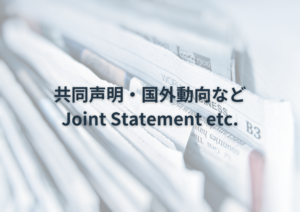<Press Release>
G7 Summit: Japan commits to coal phase-out, decarbonized energy sector
Now is the time for concrete targets and policy measures to achieve them
June 29, 2022
Kiko Network
Mie Asaoka, President
On June 26-28, at the G7 Summit in Elmau, Germany, climate change was a major focus of discussions, and a number of commitments to accelerate the phase-out of fossil fuels were agreed to that show positive progress for Japan’s path to decarbonization.
One of the key agreements was to phase out coal-fired power, by prioritizing “concrete and timely steps towards the goal of accelerating phase-out of domestic unabated coal power generation.” Kiko Network welcomes Prime Minister Kishida agreeing to this important commitment toward a coal-free world. However, in order to be consistent with the Paris Agreement's goal of limiting global temperature rise to 1.5°C, developed countries will need to phase out coal-fired power generation by 2030. At this summit, the G7 countries reaffirmed their “unwavering commitment to the Paris Agreement, and its strengthened implementation”, and so in order to realize this commitment, Japan must set a concrete path to retiring all domestic coal-fired power plants by 2030.
Another important announcement is the commitment to achieve “a fully or predominantly decarbonised power sector by 2035.” This commitment is even more ambitious than the communique from the climate, energy, and environment ministerial meeting earlier this month, strengthening the power sector decarbonization from only “predominantly” to “fully or predominantly.” Although Japan has stated that they define “predominantly” as less than 50% fossil fuels, they also acknowledge that other G7 countries do not agree with this interpretation. This is because the International Energy Agency’s (IEA) 2050 net-zero scenario sets clear milestones for 0% coal power in 2030, and 2% or less from gas in 2035 for G7 countries. In its 6th Strategic Energy Plan, Japan is planning to have 19% coal power and 20% LNG in its 2030 energy mix - this must be promptly revised to be in line with these commitments from the G7 summit.
The G7 communique also declared a commitment to “end new direct public support for the international unabated fossil fuel energy sector by the end of 2022, except in limited circumstances clearly defined by each country consistent with a 1.5°C warming limit and the goals of the Paris Agreement.” This is a significant step in achieving decarbonized energy sectors worldwide. However, Japan is currently promoting the co-firing of hydrogen and ammonia in coal-fired power generation. It should be recognized that the term "unabated" coal-fired power generation does not include hydrogen and ammonia co-firing, and in order to fulfill this agreement, support for ammonia/hydrogen co-firing projects that extend the life of coal- and gas-fired power plants should be ended.
These commitments show that the world is serious about accelerating its energy transition to renewables and represent a significant step forward on Japan’s path to decarbonization. Now is the time to develop thorough policy roadmaps, set short- and mid-term targets, and implement concrete policy measures to realize these commitments and achieve a 2030 coal phase-out and 2035 decarbonized energy sector.
Press Release Download (PDF)
Contact
KIKO NETWORK (https://www.kikonet.org)
[Tokyo Office] 6B, Fujimori Bldg., 2-12-2, Hirakawacho, Chiyoda-ku, Tokyo 102-0093, JAPAN
TEL: 03-3263-9210、FAX:03-3263-9463、E-mail:tokyo@kikonet.org
[Kyoto Office] #305 Takakura Bldg. Takakura-dori, Shijo-agaru, Nakagyo-ku, Kyoto 604-8124, JAPAN
TEL: 075-254-1011、FAX:075-254-1012、E-mail:kyoto@kikonet.org


